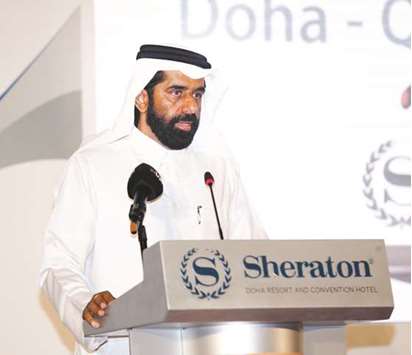Qatar has all the right ingredients to become a centre of economic and research activities and is setting the right environment to encourage investments in sectors that accelerate the transition towards the knowledge-based economy.
“Qatar has committed itself to the pillars of economic development to create a high quality economic and technological infrastructure, so as to be able to become a centre of economic and research activities,” HE the Minister of Development Planning and Statistics Dr Saleh Mohamed Salem al-Nabit yesterday told the first international business conference, organised by the Community College of Qatar (CCQ).
Qatar sets goals related to sponsoring, developing, adopting and instilling innovation in sectors with priority, and uniting and co-ordinating national efforts in order to achieve excellence in research and development, through the creation of platforms and databases available to all and developing co-ordination mechanisms to maximise consistency and use of available resources among research bodies, he said.
He also emphasised that Qatar works to ensure the sustainability of economic boom in the coming five years with continuing efforts towards more economic diversification, the development of private sector, attracting foreign investments, especially those looking for creativity and innovation, and setting the right environment to encourage investments in sectors that accelerate the transition towards the knowledge-based economy.
“Qatar has moved steadily and successfully towards the transition to a knowledge-based economy,” al-Nabit said.
The CCQ conference seeks to analyse Qatar’s knowledge-based innovation dynamics and explore prospective opportunities and challenges to arrive at insights useful for the decision makers in the country.
Qatar is home to large numbers of expatriate workers with most of them unskilled, he said, adding the time has however come to go in for the introduction of more skilled and experience skill set.
CCQ president Dr Ibrahim bin Saleh al-Naimi said today’s economies do not depend any more on land, workforce and capital as it was in the conventional economy, but more on knowledge that is based on ideas, information and communications technologies and artificial intelligence.
Referring to the minister’s remarks on Qatar’s progress towards transition to knowledge-based economy, al-Naimi said, “We have seen the results of this transition in the evolution of education and higher education, the allocation of huge resources and investments for education sector.”
During the first day of the conference, as many as 14 sessions were held on a wide range of research papers covering various areas related to knowledge-based economy including all sub-fields and related topics in economics, accounting, finance, marketing, management and business ethics.
Business / Business
Qatar has all right ingredients to become centre of economic, research activities: Al-Nabit

HE al-Nabit: Qatar moves steadily and successfully towards a knowledge-based economy.

